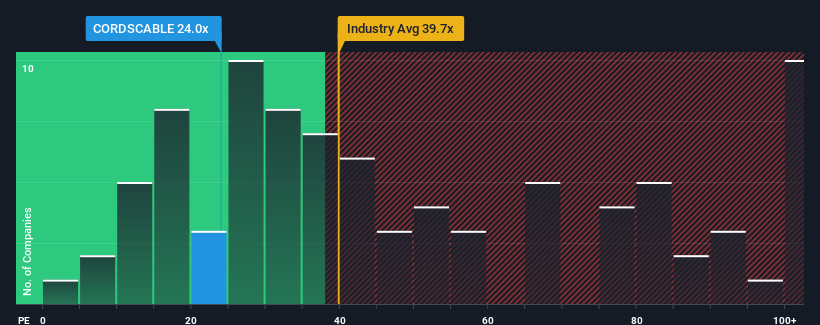- India
- /
- Electrical
- /
- NSEI:CORDSCABLE
Cords Cable Industries Limited (NSE:CORDSCABLE) Surges 25% Yet Its Low P/E Is No Reason For Excitement
Cords Cable Industries Limited (NSE:CORDSCABLE) shareholders have had their patience rewarded with a 25% share price jump in the last month. The annual gain comes to 104% following the latest surge, making investors sit up and take notice.
Even after such a large jump in price, Cords Cable Industries' price-to-earnings (or "P/E") ratio of 24x might still make it look like a buy right now compared to the market in India, where around half of the companies have P/E ratios above 32x and even P/E's above 59x are quite common. However, the P/E might be low for a reason and it requires further investigation to determine if it's justified.
Earnings have risen firmly for Cords Cable Industries recently, which is pleasing to see. It might be that many expect the respectable earnings performance to degrade substantially, which has repressed the P/E. If you like the company, you'd be hoping this isn't the case so that you could potentially pick up some stock while it's out of favour.
See our latest analysis for Cords Cable Industries

How Is Cords Cable Industries' Growth Trending?
Cords Cable Industries' P/E ratio would be typical for a company that's only expected to deliver limited growth, and importantly, perform worse than the market.
Taking a look back first, we see that the company managed to grow earnings per share by a handy 12% last year. Ultimately though, it couldn't turn around the poor performance of the prior period, with EPS shrinking 1.1% in total over the last three years. Accordingly, shareholders would have felt downbeat about the medium-term rates of earnings growth.
In contrast to the company, the rest of the market is expected to grow by 25% over the next year, which really puts the company's recent medium-term earnings decline into perspective.
With this information, we are not surprised that Cords Cable Industries is trading at a P/E lower than the market. Nonetheless, there's no guarantee the P/E has reached a floor yet with earnings going in reverse. Even just maintaining these prices could be difficult to achieve as recent earnings trends are already weighing down the shares.
The Key Takeaway
Cords Cable Industries' stock might have been given a solid boost, but its P/E certainly hasn't reached any great heights. We'd say the price-to-earnings ratio's power isn't primarily as a valuation instrument but rather to gauge current investor sentiment and future expectations.
As we suspected, our examination of Cords Cable Industries revealed its shrinking earnings over the medium-term are contributing to its low P/E, given the market is set to grow. At this stage investors feel the potential for an improvement in earnings isn't great enough to justify a higher P/E ratio. If recent medium-term earnings trends continue, it's hard to see the share price moving strongly in either direction in the near future under these circumstances.
It is also worth noting that we have found 3 warning signs for Cords Cable Industries (1 makes us a bit uncomfortable!) that you need to take into consideration.
Of course, you might also be able to find a better stock than Cords Cable Industries. So you may wish to see this free collection of other companies that have reasonable P/E ratios and have grown earnings strongly.
New: AI Stock Screener & Alerts
Our new AI Stock Screener scans the market every day to uncover opportunities.
• Dividend Powerhouses (3%+ Yield)
• Undervalued Small Caps with Insider Buying
• High growth Tech and AI Companies
Or build your own from over 50 metrics.
Have feedback on this article? Concerned about the content? Get in touch with us directly. Alternatively, email editorial-team (at) simplywallst.com.
This article by Simply Wall St is general in nature. We provide commentary based on historical data and analyst forecasts only using an unbiased methodology and our articles are not intended to be financial advice. It does not constitute a recommendation to buy or sell any stock, and does not take account of your objectives, or your financial situation. We aim to bring you long-term focused analysis driven by fundamental data. Note that our analysis may not factor in the latest price-sensitive company announcements or qualitative material. Simply Wall St has no position in any stocks mentioned.
About NSEI:CORDSCABLE
Cords Cable Industries
Engages in the design, development, manufacture, and sale of power, control, instrumentation, thermocouple extension/compensating, and communication cables in India.
Solid track record with low risk.
Similar Companies
Market Insights
Community Narratives




